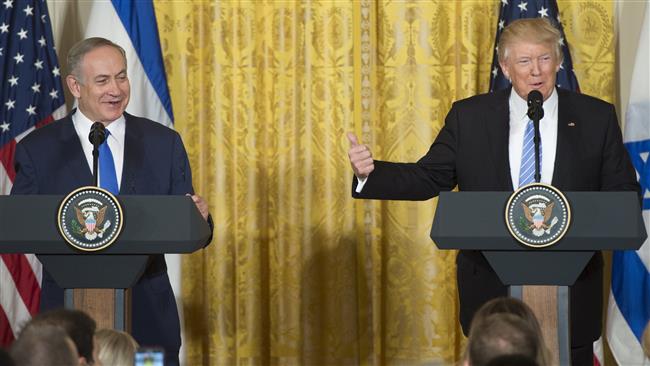
RNA - In an exclusive report, the Israeli Haaretz newspaper, citing unnamed senior officials in former US President Barack Obama's administration, announced the news on Sunday, adding that the three convened on February 21, 2016 in the Jordanian Red Sea resort of Aqaba.
The report said the three had attended the clandestine summit to consider Kerry’s plan, which included the recognition of Israel as a “Jewish state” and a rekindling of negotiations with Palestinian authorities with support of the Arab countries.
The initiative, however, failed after the Israeli premier withdrew his initial support, arguing that he had faced stiff opposition within his ruling right-wing Likud party, the report said, adding that Palestinian President Mahmoud Abbas did not join the meeting but was informed about its outcome by Kerry.
The plan, whose six principles were laid out publicly by Kerry late last year, also included a call for the Israeli regime to withdraw from territory it had occupied during the 1967 Six-Day War. Since the war Israel has annexed East Jerusalem al-Quds and the Golan Heights, a massive land grab that has never been recognized by the international community.
Kerry’s plan also included that both Israel and Palestine should share Jerusalem al-Quds as their shared internationally recognized capital, which Tel Aviv calls it its “undivided” capital. Netanyahu's coalition government flatly rejects the talk of relinquishing the sovereignty of any part of the contested city to Palestinians.
In the past few days, far-right members of Netanyahu’s coalition have praised controversial remarks by US President Donald Trump that he was open to new ways to attain peace, which did not necessarily entail formation of a Palestinian state, a standard of the White House’s foreign policy for decades.
“I’m looking at two states and one state, and I like the one both parties like,” Trump said in a joint peace conference with the Israeli prime minister in Washington on February 15.
On Thursday, however, US Ambassador to the United Nations Nikki Haley said Washington still backed a two-state solution to the conflict. Haley’s comments were also echoed by Israeli Minister of Military Affairs Avigdor Lieberman in the 53rd Munich Security Conference. “The end game is no doubt a two-state solution,” he said.
Since January 20, when Trump, an ardent supporter of Israel, took office, Tel Aviv has launched a major land grab drive in defiance of global calls to stop its settlement activities on occupied Palestinian lands.
Over 230 settlements have been built since the 1967 Israeli occupation of the Palestinian territories of the West Bank and Jerusalem al-Quds, which the Palestinians want as the capital of their future independent state.
847/940